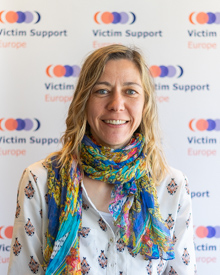
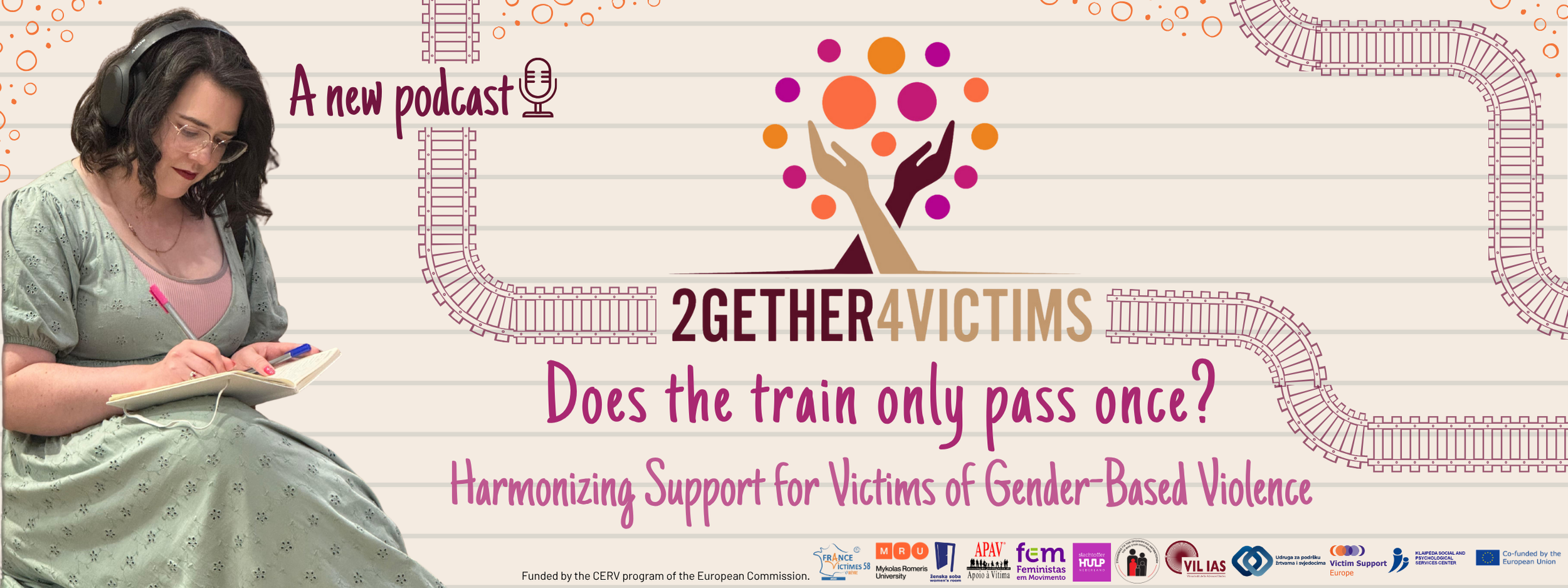
Does the Train Only Pass Once? The 2Gether4Victims Podcast Launches Today
Does the Train Only Pass Once? A Unique Train Journey Across Europe Exploring the Complexities of Support Services for Victims of Gender-Based Violence — and the New Tools Being Developed to Strengthen Frontline Help
Does the Train Only Pass Once? Is a new twelve-part audio documentary, taking listeners on an immersive train journey across Europe to explore how support services for victims of gender-based violence can—and must—improve.
Created by Victim Support Europe in partnership with ten organisations and funded by the European Commission’s CERV program, the podcast gives voice to survivors, experts, and front-line support workers who are working to make sure victims are not left standing alone when the train of help arrives.
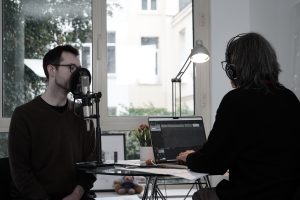 At the heart of the series is Anna, an independent podcaster, sound researcher, and survivor of domestic abuse. Traveling across Europe, she records an audio diary with her narration and interviews that explore the complex subject of gender-based violence and victimisation. Through rich soundscapes as soundtracks—whispers of train whistles, bustling stations, and quiet reflections—that mirror the complexity and variety of the society we live in, Anna guides listeners through Belgium, Croatia, Cyprus, France, Lithuania, the Netherlands, and Portugal. She uncovers what works in victim support—such as innovative local programs in Croatia and strong legal protections in France—what doesn’t, and what more must be done to ensure every victim gets the help they need.
At the heart of the series is Anna, an independent podcaster, sound researcher, and survivor of domestic abuse. Traveling across Europe, she records an audio diary with her narration and interviews that explore the complex subject of gender-based violence and victimisation. Through rich soundscapes as soundtracks—whispers of train whistles, bustling stations, and quiet reflections—that mirror the complexity and variety of the society we live in, Anna guides listeners through Belgium, Croatia, Cyprus, France, Lithuania, the Netherlands, and Portugal. She uncovers what works in victim support—such as innovative local programs in Croatia and strong legal protections in France—what doesn’t, and what more must be done to ensure every victim gets the help they need.
The title “Does the Train Only Pass Once?” is inspired by the metaphor of fleeting opportunities – symbolized by passing trains—that may seem rare. In this context, it serves as a reminder that while some chances may pass, new opportunities for recovery, growth, and transformation are always possible, especially when effective support systems are in place. Ultimately, the podcast highlights that with the right systems in place, victims can rebuild, reclaim their stories, and find strength on the other side of trauma.
The first episodes ask tough but necessary questions. Episode one explains what the 2gether4victims project is and why it could change lives for millions across Europe. Next, experts break down the myths and stigma that stop victims from getting help. The series also unpacks what gendered support services really mean — help shaped to match victims’ real needs. “Our research shows how vital it is to tailor support for victims of domestic and gender-based violence,” says Ivankovic, Deputy Director of Victim Support Europe. “It’s not just about shelters or hotlines — it’s about connecting specialist and multi-crime services so victims don’t slip through the cracks.”
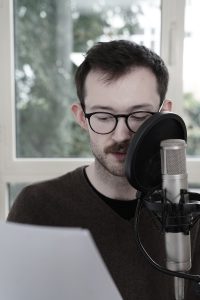 Later, survivors share honest stories of rebuilding life after violence. Listeners also hear how communities and laws are evolving, from stronger sexual violence protections to local prevention work in Croatia. “According to the EU’s Commissioner for Equality, gender-based violence against women costs the EU about €226 billion a year,” says Ivankovic. “Evidence shows it’s actually cheaper to properly implement victims’ rights than to do nothing. The way we see it — victim support is not a cost, it’s an investment. For every euro you spend, at least five are saved elsewhere. Costs and benefits must be looked at as a whole and in the longer term.”
Later, survivors share honest stories of rebuilding life after violence. Listeners also hear how communities and laws are evolving, from stronger sexual violence protections to local prevention work in Croatia. “According to the EU’s Commissioner for Equality, gender-based violence against women costs the EU about €226 billion a year,” says Ivankovic. “Evidence shows it’s actually cheaper to properly implement victims’ rights than to do nothing. The way we see it — victim support is not a cost, it’s an investment. For every euro you spend, at least five are saved elsewhere. Costs and benefits must be looked at as a whole and in the longer term.”
Other episodes look at issues often ignored, like abuse against older people, and how workplaces can become safer and more supportive for victims.
Ivankovic knows first-hand how everyday discrimination shapes people’s lives in ways big and small. “I do not want any of my children or their friends to be taught that there are exceptions to equality,” she says, recalling how her son was barred from school twice — once for wearing an earring and again for a hairstyle. “My vision is to ensure there is no bias to delivering all forms of equality.”
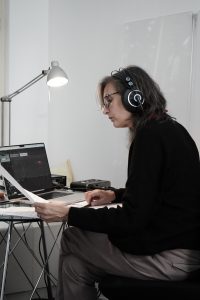 In the second part of the podcast, coming out between February and April 2026, listeners will hear directly from the experts shaping two ground-breaking tools under the 2gether4victims project — the Organisational Self-Assessment and the Individual Needs Assessment. They’ll break down how these tools will help shelters, crisis centres, and frontline services find their weak spots, close gaps, and deliver care that truly matches each victim’s reality. For millions across Europe, this could mean safer spaces, better-trained staff, and support systems that finally see victims not as numbers, but as people who deserve real help — and real hope.
In the second part of the podcast, coming out between February and April 2026, listeners will hear directly from the experts shaping two ground-breaking tools under the 2gether4victims project — the Organisational Self-Assessment and the Individual Needs Assessment. They’ll break down how these tools will help shelters, crisis centres, and frontline services find their weak spots, close gaps, and deliver care that truly matches each victim’s reality. For millions across Europe, this could mean safer spaces, better-trained staff, and support systems that finally see victims not as numbers, but as people who deserve real help — and real hope.
Sara Maino, the producer behind the series, hopes the podcast will push the conversation forward. “I’ve been following this issue for a long time, especially in Italy—where, like in much of Europe, gender-based violence remains a huge problem,” she says. “Hearing victims and experts challenge myths and show what real, practical support looks like—it’s powerful. The project results will hopefully make a difference, one victim at a time.”
For Melanie, one of the survivors featured, that difference is deeply personal. “The secret is support. I was lucky, but I know many wait a long time before getting it.” What kept her going was knowing help exists—a social worker came every other week to listen, teach her about domestic violence, and help her see what was real. Sometimes, survivors feel like they’ve missed their chance. But every new day can be a new train to catch. What kept Melanie going was knowing there’s help out there—if you know where to look.
After each encounter, Anna’s reflections echo the journey’s deeper message. As she watches the landscape slip by through the train window, she reminds herself—and the listener—why these conversations matter: “Recording my story helped me find balance again. If we don’t talk about it, we stay stuck on the same platform forever.”
Does the Train Only Pass Once? will run in two parts: the first six episodes from September to November 2025, and the final six from February to April 2026. Listeners can follow Anna’s journey and the voices she meets on the Victim Support Europe website podcast section, YouTube Podcast, and Spotify.

